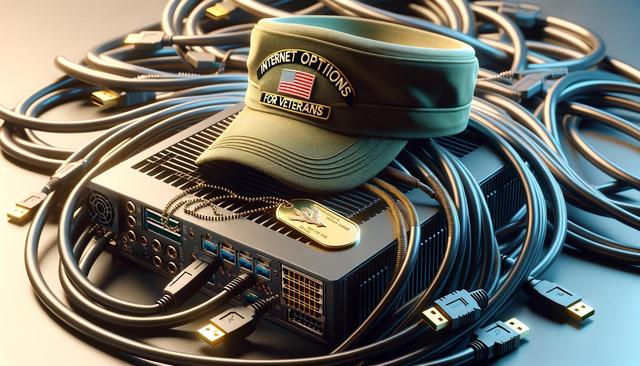Internet Options for Veterans: Staying Connected Affordably
Discover affordable internet plans for veterans. Access low-cost broadband and high-speed connections designed to support those who served, helping veterans stay connected and access essential online resources.

Understanding Internet Needs for Veterans
Veterans often face unique challenges when transitioning to civilian life, and access to reliable internet service can play a crucial role in this process. From scheduling medical appointments and accessing VA benefits to applying for jobs and staying in touch with loved ones, a strong internet connection is more than just a convenience—it’s a necessity. For older veterans or those living in rural areas, finding affordable and dependable broadband services can be particularly difficult. Recognizing these challenges, several government programs and providers have developed services specifically tailored to assist veterans with their internet needs.
Key considerations for veterans when choosing an internet service include:
- Cost and available discounts
- Geographic availability, especially in rural areas
- Speed and reliability of the connection
- Customer service and technical support options
Evaluating these factors will help veterans select an internet service that aligns with their lifestyle, budget, and specific requirements.
Government Programs Supporting Connectivity
Several federal initiatives aim to make internet access more affordable for veterans. One of the most significant is the Affordable Connectivity Program (ACP), a government-backed benefit that helps eligible individuals reduce their monthly internet bills. Veterans who receive benefits like the VA Pension, Survivors Benefit, or qualify through income thresholds may be eligible for this program. The ACP can offer a monthly discount and even a one-time subsidy toward purchasing a device such as a laptop or tablet.
Other initiatives that can support veterans include:
- Lifeline Program – Offers discounted phone and internet services for low-income individuals, including veterans
- USDA ReConnect Program – Focuses on expanding broadband access in rural areas, which can benefit veterans living in less populated regions
- State-specific programs – Some states have their own subsidies or initiatives aimed at improving internet accessibility for veterans
By leveraging these programs, veterans can significantly reduce the cost of staying connected and ensure they have access to the digital tools needed for modern life.
Low-Cost Internet Plans from Providers
In addition to federal programs, many internet service providers offer specialized plans for veterans. These plans are often priced lower than standard packages and may include additional benefits such as free installation, no-credit-check options, or waived equipment fees. While these offerings vary by provider and region, they typically aim to ensure that veterans have access to reliable internet without financial strain.
Some features commonly found in veteran-focused internet plans include:
- No annual contracts
- Flexibility to pause or cancel service without penalty
Before choosing a plan, veterans should inquire directly with providers about available discounts and ensure they have the necessary documentation to prove eligibility. Comparing plans side-by-side can also help identify the most cost-effective and feature-rich option available.
Internet Access in Rural and Underserved Areas
Rural internet access remains a significant challenge for many veterans, especially those who reside far from urban centers. Infrastructure limitations often mean that high-speed broadband is either unavailable or prohibitively expensive. Fortunately, there are several emerging technologies and initiatives that are helping to bridge this gap. Satellite internet, for instance, can offer a viable solution for remote areas where traditional cables or fiber-optic connections are not feasible.
Other developments helping rural veterans include:
- Mobile hotspots and data plans as temporary solutions
- Community internet hubs provided by local libraries or veterans’ centers
- Municipal broadband networks in certain towns and counties
Veterans living in these areas should research local resources and reach out to community organizations that may offer support or guidance in securing a reliable internet connection.
Digital Literacy and Support Services
Beyond access, digital literacy is another crucial element for veterans navigating the online world. Some veterans may not be familiar with modern technology, especially older individuals or those who had limited exposure during service. To address this, many organizations and VA-affiliated centers offer digital training sessions, workshops, and one-on-one assistance to help veterans learn how to use the internet safely and effectively.
Helpful digital literacy services for veterans include:
- Basic computer and internet usage tutorials
- Guidance on using online healthcare portals
- Security awareness training to avoid scams and fraud
These services not only empower veterans to make the most of their internet access but also help them gain confidence in using digital tools for everyday life—from managing finances to staying socially connected.
Conclusion: Supporting Veterans Through Digital Inclusion
Reliable and affordable internet access is more than a utility—it’s a gateway to essential services, opportunities, and community for veterans. By taking advantage of government programs, low-cost provider plans, and local resources, veterans can overcome the digital divide and lead more connected, informed, and empowered lives. Whether living in a city or a remote rural area, exploring the available internet options can open doors to a more accessible and supportive future for those who served.